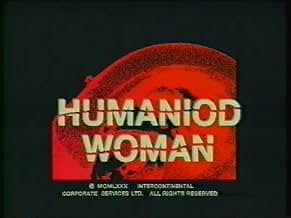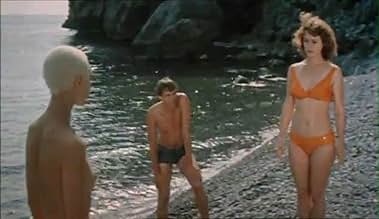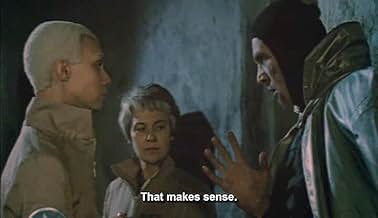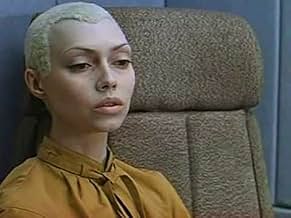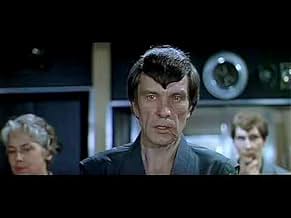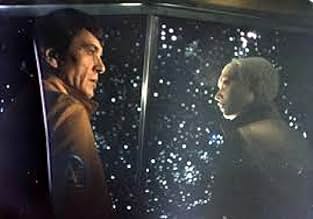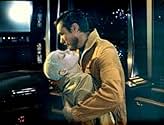IMDb-BEWERTUNG
6,0/10
1560
IHRE BEWERTUNG
Füge eine Handlung in deiner Sprache hinzuA female creature created in space tries to live on earth and has special (and sometimes dangerous) powers.A female creature created in space tries to live on earth and has special (and sometimes dangerous) powers.A female creature created in space tries to live on earth and has special (and sometimes dangerous) powers.
- Regie
- Drehbuch
- Hauptbesetzung
- Auszeichnungen
- 1 Nominierung insgesamt
Uldis Lieldidzs
- Sergei Lebedev
- (as Uldis Lieldidz)
Empfohlene Bewertungen
10dimarec
This movie belongs to the russian/soviet culture - this is the reason why so many negative comments are manifested here on IMDB. Besides, the Americanized version ("Humanoid Woman") was cropped and too much spoiled by nasty dubbing, that the whole film's concept has shifted. HOW COULD ONE SAY HERE: "there are some treasure hunters who want to use her at the archaeological dig, so they can become rich and famous"?!! There is nothing like that AT ALL!! And so on about other "comments" available here. The film has a very intelligent plot, written by the famous russian SF writer Kir Bulichev. The director's work is excellent. For example Niya's character is played by non-professional actress Elena Metyolkina, who actually was a model. It was the director's design just to introduce some elements of robot-like behavior. The director managed to make her play as good as possible. All other actors play their characters very persuadingly also. I just wonder how can one abuse the music - it is superb. Of course there should be correction for poor picture and sound quality, presented on the Americanized version. But this film deserves to be watched in its original version and with the TRUE dubbing - JUST TO UNDERSTAND IT. BTW now its remastered version on DVD exists, with both picture and sound quality being superb.
Summing up I want to say this film is not a cheap entertainment as some comments here suggest. It is a very kind, heartful, gentle, touching and thought-provoking movie. It is about love - love to people, love to the Earth. Of course there is certain naivity about the film, but it only adds positive to its atmosphere. I see everything quite balanced in it. Some may see flaws in film's imperfect setting (compared with "Alien" or "Star Wars" for example)- of course Holliwood was much more advanced in Sci-fi making (and a lot richer besides), than the Soviet cinema. But that does not seem too important.
Summing up I want to say this film is not a cheap entertainment as some comments here suggest. It is a very kind, heartful, gentle, touching and thought-provoking movie. It is about love - love to people, love to the Earth. Of course there is certain naivity about the film, but it only adds positive to its atmosphere. I see everything quite balanced in it. Some may see flaws in film's imperfect setting (compared with "Alien" or "Star Wars" for example)- of course Holliwood was much more advanced in Sci-fi making (and a lot richer besides), than the Soviet cinema. But that does not seem too important.
It's hard to comment this movie for the non-Russian auditory but I'll try to explain everything.
As far as I see nearly no one here knows the reasons why all the Soviet sci-fi had poor special effects. The reason is simple: in Soviet Union were NO commercial movie industry at all. Movie makers were making their movies and had month pays for their work. When they began making a new movie they showed the screenplay to the ministry of culture and if the ministry accepted it it allotted them some money from the state budget. Any sci-fi had never been that politically correct in comparison to war or revolution movies and thus the budget of such movies was ALWAYS very small. You can understand how much devotion to the work and art was needed to make such films in such conditions. This is the reason why soviet sci-fi movie makers always tried to put into their movies the things that were not dependent on budget. They put ideas. Soviet way of life and way of thinking was much enclosed in itself and developed enclosed. Influence of western culture was rather subtle because all the borders were closed. Contraband products were rare and highly illegal. No one have seen any of the non-Soviet sci-fi movies until the very end of 80's.
"Cherez ternii k zvyozdam" ("Per aspera ad astra" is the correct translation) have one of the best special effects ever made in the Soviet Union, seriously. So ignore them, they are not the central piece of the movie. The central piece is the ideas, the characters and the acting. The visions of the ecological catastrophe were rather fresh in 1981 for the whole world, the more in the Soviet Union where government always told everyone that the future is bright. According to the screenplay there should have been the ending title saying "All the scenes of the dying planet Dessa were shot at the territory of the Soviet Union". No need to say that that title was censored out (now it was added in the new re-edited DVD version).
I see that many of those who have seen "Cherez ternii k zvyozdam" misunderstand its plot. It's very strange because the plot is clear and straightforward, possibly it's all because of the poor translation. In fact only the concluding scene may be found somewhat strange because it has purely allegoric meaning: creation of the new life.
All acting is nearly perfect, no need to describe it, especially amazing are the roles of the economical tyrant Turanchox by Vladimir Fyodorov, Ambassador Rakan by Vadim Ledogorov and of course, Niya the Artificial Human by Yelena Metyolkina.
9 of 10. Find a well-translated version, turn on your brain and you'll understand why I rated it so.
As far as I see nearly no one here knows the reasons why all the Soviet sci-fi had poor special effects. The reason is simple: in Soviet Union were NO commercial movie industry at all. Movie makers were making their movies and had month pays for their work. When they began making a new movie they showed the screenplay to the ministry of culture and if the ministry accepted it it allotted them some money from the state budget. Any sci-fi had never been that politically correct in comparison to war or revolution movies and thus the budget of such movies was ALWAYS very small. You can understand how much devotion to the work and art was needed to make such films in such conditions. This is the reason why soviet sci-fi movie makers always tried to put into their movies the things that were not dependent on budget. They put ideas. Soviet way of life and way of thinking was much enclosed in itself and developed enclosed. Influence of western culture was rather subtle because all the borders were closed. Contraband products were rare and highly illegal. No one have seen any of the non-Soviet sci-fi movies until the very end of 80's.
"Cherez ternii k zvyozdam" ("Per aspera ad astra" is the correct translation) have one of the best special effects ever made in the Soviet Union, seriously. So ignore them, they are not the central piece of the movie. The central piece is the ideas, the characters and the acting. The visions of the ecological catastrophe were rather fresh in 1981 for the whole world, the more in the Soviet Union where government always told everyone that the future is bright. According to the screenplay there should have been the ending title saying "All the scenes of the dying planet Dessa were shot at the territory of the Soviet Union". No need to say that that title was censored out (now it was added in the new re-edited DVD version).
I see that many of those who have seen "Cherez ternii k zvyozdam" misunderstand its plot. It's very strange because the plot is clear and straightforward, possibly it's all because of the poor translation. In fact only the concluding scene may be found somewhat strange because it has purely allegoric meaning: creation of the new life.
All acting is nearly perfect, no need to describe it, especially amazing are the roles of the economical tyrant Turanchox by Vladimir Fyodorov, Ambassador Rakan by Vadim Ledogorov and of course, Niya the Artificial Human by Yelena Metyolkina.
9 of 10. Find a well-translated version, turn on your brain and you'll understand why I rated it so.
..then people would understand it in its full beauty. It seems many reviewers condemn it for the particular - such as a poor example of scifi cinema robot or alien (the latter competing with that of Dark Star), or a sequence where a villain is found to be ticklish, which sets them oblivious as to the signifiance thereof and the movie's meta-narrative.
For me, this film is of the school which performs a deftly deceptive lightness of touch around profound issues. But here, uniquely, we see utilised measured and studied absurdist interludes, and a romantic dreamlike dynamic. I write 'deceptive', because at its core, if you care to look deeper into the pool, there is a story which is a subtle yet quite profound exposition of and meditation on the nature of isolation; the yearning inherent in loneliness (who in their heart didn't hope for Neeya to be comforted with kisses and held in a loving embrace by Stepan before the end?) the transitory nature of being; how great beauty can exist alongside great tragedy; the whole wrapped in an environmental parable.
Oh, and the soundtrack is powerfully evocative, like a fleeting nimbus of forgotten childhoods around quotidian adulthood; the shimmering whimsical harpsichord figure alternating with tone-poems and Kraftwerkian industrial-electro grooves on analogue synth are utterly fitting.
Whenever there's a Sci-Fi/Fantasy film festival doing a special around virtually untraceable movies, in my case the Offscreen Festival in Belgium, you simply must attend it as much as possible, because where else will you ever be offered the chance to see titles like "To the Stars by Hard Ways". The festival scheduled a theme around Sci-Fi movies from behind the Iron Curtain and, amongst more commonly known classics like the original "Solaris" and "In the Dust of Stars", they showed this peculiar but strangely poetic and compelling space allegory that consists of three main chapters. The film is set in futuristic Russia, where stereotypical house robots stroll around bleeping and people go to their jobs on distant planets. An outer space mission brings back an intergalactic female immigrant who has curly white hair behaves very nervously. The lead astronaut decides to take her into his house for research and to introduce her to earthly hospitality. The first chapter of "To the Stars by Hard Ways" revolves on the girl, Niya, integrating with her new family. She becomes friends with the astronaut's mother and adolescent son and learns about jealousy when she meets his girlfriend. In spite of her relatively happy new life, Niya has unclear but nightmarish flashbacks about what overcame her on her own planet. The tone of this first chapter is moody but tolerably sentimental. It's like a futuristic soap opera, but from the Soviet Union. The second chapter depicts the space trip to Niya's home planet Dessa. The nightmares and flashbacks stimulated her to slip aboard as a stowaway during Stepan's first official mission as an astronaut. The second chapter really is nothing more than a transition between the sequences on earth and on a distant planet. The middle section is rather dull and contain quite a few irrelevant and unnecessary comical interludes, like dropping off a passenger on his home planet called Ocean. He's a watery blubber thing who lives in a washing machine and is petrified of cats. The third and final chapter is the most interesting for the fans, as it concerns pure and genuine Sci-Fi full of desolate apocalyptic landscapes, malignant looking alien races and uncanny atmosphere. Niya's planet Dessa has become uninhabitable due to a massive industrial catastrophe while the tyrannical rules, called the Turanchoks, are selling clean oxygen at high prices. The final chapter of "To the Stars by Hard Ways" is exciting, often unsettling and very absorbing.
It's a bit of a shame that most comments around here (expect for those written by Russian users) are so harshly negative and mainly talking about the notorious MST3K treatment that the movie received in the late 80's. Now, I'm as much a fan of MST3K as anyone else, but there's a lot more underneath this film's campy surface and deserves some deeper analysis. People are complaining about the horrible dubbing, the terrible music, the cheap and campy special effects and the bad acting performances. I beg to differ on practically all points. Another major advantage about seeing this type of movies at a festival is that they respect cinema enough to seek for a 35mm version in the original language. Personally I liked the psychedelic music tunes and the special effects, well, Naturally they're not very groundbreaking or on par with the contemporary super popular "Star Wars" franchise, but what do you expect from a film from a politically and hermetically sealed off country without much of a cinema culture. "To the Stars by Hard Ways" is primarily a very ambitious story-driven movie, from the hand of the acclaimed Russian novelist Kir Bulychyov and directed by Richard Victorov with great devotion and passion for Sci-Fi. The acting is terrific, especially from the central figure Yelena Metyolkina who made her first ever screen appearance in this film. "The the Stars by Hard Ways" definitely isn't without flaws, but it's a captivating experience that forces you to switch on your brain functions as well as all your senses. Recommended, but please watch the original version or the respectfully restored 2001 version.
It's a bit of a shame that most comments around here (expect for those written by Russian users) are so harshly negative and mainly talking about the notorious MST3K treatment that the movie received in the late 80's. Now, I'm as much a fan of MST3K as anyone else, but there's a lot more underneath this film's campy surface and deserves some deeper analysis. People are complaining about the horrible dubbing, the terrible music, the cheap and campy special effects and the bad acting performances. I beg to differ on practically all points. Another major advantage about seeing this type of movies at a festival is that they respect cinema enough to seek for a 35mm version in the original language. Personally I liked the psychedelic music tunes and the special effects, well, Naturally they're not very groundbreaking or on par with the contemporary super popular "Star Wars" franchise, but what do you expect from a film from a politically and hermetically sealed off country without much of a cinema culture. "To the Stars by Hard Ways" is primarily a very ambitious story-driven movie, from the hand of the acclaimed Russian novelist Kir Bulychyov and directed by Richard Victorov with great devotion and passion for Sci-Fi. The acting is terrific, especially from the central figure Yelena Metyolkina who made her first ever screen appearance in this film. "The the Stars by Hard Ways" definitely isn't without flaws, but it's a captivating experience that forces you to switch on your brain functions as well as all your senses. Recommended, but please watch the original version or the respectfully restored 2001 version.
7cema
Cherez ternii... was released when I was a boy of 14 living in the Soviet Union and hungry for anything sci-fi. Well, this one fit the bill perfectly. With a typical 1980s story (ecological catastrophe, hints on the "soullessness of the capitalist society") and special effects somewhat more advanced than those of the British Dr. Who series, it still was two heads above anything else released in the USSR until then.
The film became an instant hit.
Now, keep in mind that we could not see the Star Wars or any other of the many Western sci-fi flicks of the time, with rare exceptions. And the sci-fi culture of the "socialist camp" was, no pun, campy. Special effects were typically like those of the early Dr. Who series (not that we had heard anything of Dr. Who either), and the plot simple as a nursery rhyme. In this context, Cherez ternii was a star indeed.
Plus, the nude scene, albeit short, was unusual for the Soviet cinematography of the time and rather attractive to the boys who had just advanced to the adolescent state.
All this made the fan base of the movie as wide as the Soviet Union itself, which is about as wide as Russia is now. Speaking of which, those boys of 1981 are today grownups, and so they decided to re-release Cherez ternii, with an improved picture and sound quality and somewhat rehashed frame sequence. If you understand Russian and decide to watch it, you can order it online.
As an adult, I would rate Chere Ternii k Zvezdam about the same as an average Star Trek episode, no better, no worse. Wish I could see Star Trek when I was a child.
The director of Cherez Ternii, R. Viktorov, made two more cult sci-fi films: Moskva-Kassiopeya (Moscow to Cassiopeia) and Otroki vo Vselennoj (Youths in the Universe). Check them out if you feel like it.
Oh, and btw, this Sandy Frank's version, Humanoid Woman, is total crap. But you knew that already, didn't you?
The film became an instant hit.
Now, keep in mind that we could not see the Star Wars or any other of the many Western sci-fi flicks of the time, with rare exceptions. And the sci-fi culture of the "socialist camp" was, no pun, campy. Special effects were typically like those of the early Dr. Who series (not that we had heard anything of Dr. Who either), and the plot simple as a nursery rhyme. In this context, Cherez ternii was a star indeed.
Plus, the nude scene, albeit short, was unusual for the Soviet cinematography of the time and rather attractive to the boys who had just advanced to the adolescent state.
All this made the fan base of the movie as wide as the Soviet Union itself, which is about as wide as Russia is now. Speaking of which, those boys of 1981 are today grownups, and so they decided to re-release Cherez ternii, with an improved picture and sound quality and somewhat rehashed frame sequence. If you understand Russian and decide to watch it, you can order it online.
As an adult, I would rate Chere Ternii k Zvezdam about the same as an average Star Trek episode, no better, no worse. Wish I could see Star Trek when I was a child.
The director of Cherez Ternii, R. Viktorov, made two more cult sci-fi films: Moskva-Kassiopeya (Moscow to Cassiopeia) and Otroki vo Vselennoj (Youths in the Universe). Check them out if you feel like it.
Oh, and btw, this Sandy Frank's version, Humanoid Woman, is total crap. But you knew that already, didn't you?
Wusstest du schon
- WissenswertesThe film was restored in 2001 by director's son using film clips, shooting scripts, original camera outtakes, director's notes and surviving 70mm positive print.
- PatzerWhen they are in the "weightless" space station, one can see bubbles coming from one of the actors, revealing that the scene was filmed underwater.
- Alternative VersionenTo differentiate between original version and restored version "A New Version" subtitle is added to the title shot.The music was re-recorded, and most ADR was redone with surviving actors. The existing special effects were refined. New effects envisioned in the script that were not possible in 1979 created. The story and dialog were streamlined, and resulting cuts amounted to almost 25 minutes. The opening and closing titles were completely re-shot.
- VerbindungenFeatured in Mystery Science Theater 3000: Humanoid Woman (1989)
Top-Auswahl
Melde dich zum Bewerten an und greife auf die Watchlist für personalisierte Empfehlungen zu.
- How long is To the Stars by Hard Ways?Powered by Alexa
Details
- Erscheinungsdatum
- Herkunftsland
- Offizielle Standorte
- Sprache
- Auch bekannt als
- To the Stars by Hard Ways
- Drehorte
- Produktionsfirmen
- Weitere beteiligte Unternehmen bei IMDbPro anzeigen
- Laufzeit2 Stunden 28 Minuten
- Sound-Mix
- Seitenverhältnis
- 2.20 : 1(original ratio)
Zu dieser Seite beitragen
Bearbeitung vorschlagen oder fehlenden Inhalt hinzufügen

Oberste Lücke
By what name was Die Frau aus dem All (1981) officially released in India in English?
Antwort
